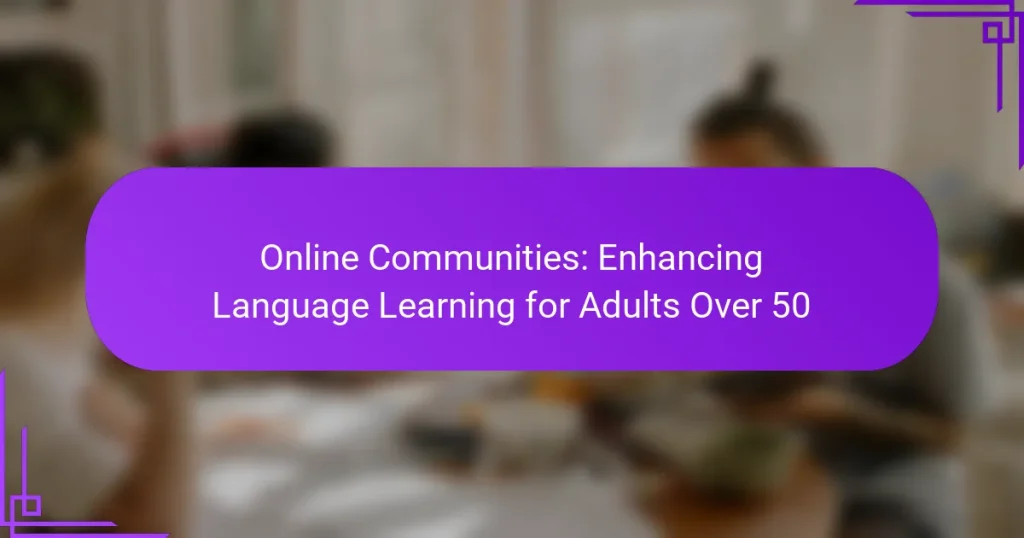Online communities play a crucial role in enhancing language learning for adults over 50 by creating a supportive and interactive environment. These platforms not only facilitate connections among learners but also provide valuable resources and opportunities for practice, making the language acquisition process more enjoyable and effective.

How can online communities improve language learning for adults over 50?
Online communities can significantly enhance language learning for adults over 50 by providing a supportive environment where learners can connect, share resources, and practice together. These platforms foster engagement and motivation, making the learning process more enjoyable and effective.
Peer support and motivation
Peer support is crucial for language learners, especially for adults over 50 who may feel apprehensive about starting something new. Online communities offer a space for individuals to share their experiences, challenges, and successes, which can boost confidence and motivation. Engaging with others who are on a similar journey helps learners stay committed to their goals.
Participating in group discussions, forums, or social media groups can create a sense of belonging. Members can encourage each other, celebrate milestones, and provide constructive feedback, making the learning experience more fulfilling.
Access to diverse resources
Online communities provide access to a wide range of language learning resources tailored for adults over 50. Members often share links to articles, videos, podcasts, and apps that cater to different learning styles and preferences. This variety allows learners to explore materials that resonate with them, enhancing their understanding and retention of the language.
Additionally, many communities curate lists of recommended resources, making it easier for learners to find high-quality content. This can include language exchange partners, online courses, or local language clubs, all of which can enrich the learning experience.
Real-time practice opportunities
Real-time practice is essential for language acquisition, and online communities facilitate this through various interactive features. Many platforms offer live chat rooms, video calls, or virtual meetups where learners can practice speaking and listening skills with peers. This immediate interaction helps reinforce learning and builds conversational confidence.
Moreover, some communities organize language challenges or themed discussion nights, providing structured opportunities for practice. Engaging in these activities can lead to significant improvements in fluency and comprehension, making language learning more dynamic and enjoyable.

What are the best online platforms for language learning communities?
Several online platforms cater specifically to language learning communities, offering unique features that can enhance the experience for adults over 50. These platforms provide opportunities for interaction, practice, and support from fellow learners, making language acquisition more engaging and effective.
Duolingo for Schools
Duolingo for Schools is a tailored version of the popular language learning app that allows teachers to create classrooms and track student progress. This platform is beneficial for adults who prefer structured learning environments, as it combines gamified lessons with community features. Users can join classes or create their own, fostering a sense of belonging and accountability.
Adults over 50 can benefit from the interactive elements, such as quizzes and leaderboards, which motivate consistent practice. Additionally, the platform offers a variety of languages, making it easy to find a community focused on specific linguistic goals.
Facebook Groups for language learners
Facebook Groups provide a versatile platform for language learners to connect, share resources, and practice together. Many groups are dedicated to specific languages or learning goals, allowing members to ask questions, share tips, and engage in discussions. This informal setting can be particularly appealing for adults over 50, who may appreciate the social aspect of learning.
To get started, search for groups that align with your language interests and request to join. Be active in discussions and consider organizing virtual meetups for practice. However, be cautious of misinformation; always verify resources shared within the group.
Meetup for language exchange
Meetup is an excellent platform for finding local or virtual language exchange groups, where learners can practice speaking with native speakers or fellow learners. This approach allows adults over 50 to engage in real-life conversations, enhancing their language skills through practical use. Many groups cater to specific languages and skill levels, making it easy to find a suitable match.
To participate, create an account, search for language-related meetups in your area or online, and RSVP to events that interest you. Regular attendance can lead to meaningful connections and improved language proficiency. Remember to be open to different learning styles and be patient with yourself and others during practice sessions.

What features should online communities have for effective learning?
Online communities for language learning should include interactive elements, personalized support, and engaging activities to enhance the experience for adults over 50. These features foster a collaborative environment that encourages practice and builds confidence in language skills.
Interactive forums and discussions
Interactive forums and discussions allow learners to engage with peers and instructors in real-time conversations. These platforms should facilitate topic-based threads where participants can ask questions, share experiences, and provide feedback on language use.
Consider using forums that are user-friendly and accessible, particularly for older adults. Features like threaded replies and easy navigation can help maintain clarity and encourage participation. Regularly scheduled discussion topics can keep the community active and focused.
Live tutoring sessions
Live tutoring sessions offer personalized instruction that can significantly enhance language acquisition. These sessions should be available at various times to accommodate different schedules, ensuring that learners can find convenient slots.
When selecting a platform, look for options that allow for small group sizes or one-on-one interactions. This setup promotes tailored feedback and allows tutors to address specific learner needs. Additionally, consider platforms that provide session recordings for later review.
Language challenges and games
Language challenges and games can make learning enjoyable and engaging. These activities encourage friendly competition and motivate learners to practice regularly, which is crucial for retention and fluency.
Incorporate a variety of games, such as vocabulary quizzes, pronunciation challenges, or role-playing scenarios. Setting up monthly challenges with rewards can also boost participation and create a sense of community. Ensure that the games are accessible and suitable for the skill levels of participants to maintain interest and inclusivity.

How do online courses enhance language learning in these communities?
Online courses significantly enhance language learning for adults over 50 by providing accessible and engaging platforms tailored to their needs. These courses often incorporate interactive elements, fostering a sense of community while allowing learners to progress at their own pace.
Structured learning paths
Structured learning paths in online courses guide learners through a well-defined curriculum, making it easier to track progress and build upon knowledge. These paths typically start with foundational concepts and gradually introduce more complex topics, ensuring that learners develop a solid understanding of the language.
For example, a course might begin with basic vocabulary and grammar, then advance to conversational skills and cultural nuances. This systematic approach helps prevent overwhelm and encourages consistent practice.
Expert-led sessions
Expert-led sessions provide learners with direct access to experienced language instructors who can offer personalized feedback and support. These sessions often include live classes, Q&A opportunities, and interactive exercises that enhance comprehension and retention.
Having experts available to clarify doubts and provide tailored advice can significantly boost confidence and motivation. Many platforms also record these sessions, allowing learners to revisit complex topics at their convenience.
Flexible scheduling options
Flexible scheduling options cater to the varying availability of adult learners, allowing them to participate in courses at times that suit their lifestyles. Many online platforms offer asynchronous learning, where participants can access materials and complete assignments at their own pace.
This flexibility is particularly beneficial for adults over 50, who may have other commitments such as work or family. By accommodating different schedules, these courses help ensure that learners can maintain a consistent study routine without added stress.

What are the prerequisites for joining an online language community?
Joining an online language community typically requires basic computer skills, internet access, and a willingness to actively participate. These prerequisites help ensure that learners can effectively engage with others and make the most of their language learning experience.
Basic computer skills
Basic computer skills are essential for navigating online platforms and participating in discussions. This includes familiarity with using a web browser, sending emails, and utilizing video conferencing tools. Many communities provide tutorials or guides to help newcomers get comfortable with the technology.
Consider practicing common tasks like joining a video call or posting in a forum before diving into the community. This preparation can enhance your confidence and reduce frustration when interacting with others.
Access to the internet
Reliable internet access is crucial for joining an online language community. A stable connection allows for smooth communication, whether through text, audio, or video. Most communities operate on platforms that require consistent internet availability, so ensure your connection meets these needs.
Check your internet speed to confirm it supports video calls, ideally above 1 Mbps for standard quality. If you experience connectivity issues, consider using a wired connection or finding a location with better service.
Willingness to engage
A willingness to engage actively is perhaps the most important prerequisite for joining an online language community. This means being open to participating in discussions, asking questions, and practicing the language with others. Active involvement can significantly enhance your learning experience.
Set personal goals for engagement, such as contributing to a discussion once a week or participating in a language exchange. This commitment can help you stay motivated and make meaningful connections within the community.

How do online communities foster social connections among learners?
Online communities create social connections among language learners by providing a platform for interaction, support, and shared learning experiences. These communities enable individuals to connect with peers who face similar challenges and goals, fostering a sense of belonging and motivation.
Shared experiences and challenges
Members of online communities often share their experiences and challenges related to language learning, which helps to normalize struggles and celebrate successes. This exchange can include discussing difficulties with grammar, pronunciation, or vocabulary, allowing learners to feel understood and supported.
For instance, a group might have a dedicated thread for discussing common hurdles, where learners can offer advice or share resources. This collaborative approach not only enhances individual learning but also strengthens community bonds.
Group events and meetups
Online communities frequently organize group events and meetups, both virtual and in-person, to enhance social connections. These events can range from language exchange sessions to cultural discussions, providing opportunities for learners to practice their skills in a supportive environment.
Participating in such events can significantly boost motivation and confidence. For example, a monthly virtual coffee chat can encourage members to converse in their target language, while local meetups can facilitate face-to-face interactions, enriching the learning experience.


